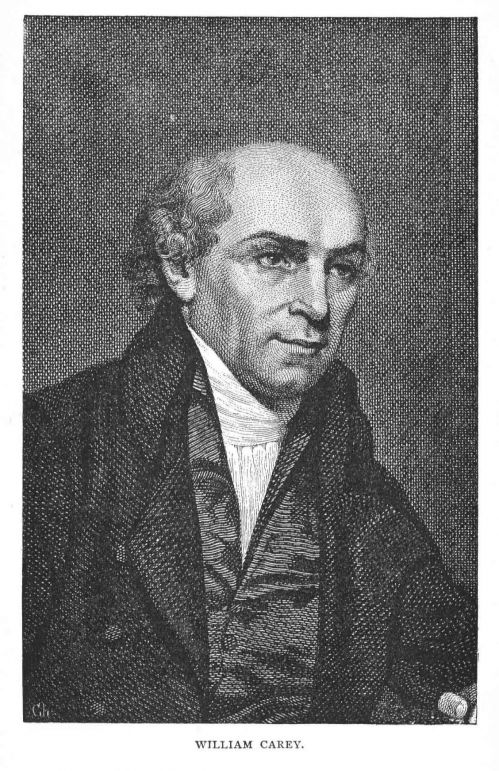
We have already had, An Enquiry into the Obligations of Christians to Use Means for the Conversion of the Heathens. Interesting title for a book and the language alone tells you how old it is!
We don’t use the word ‘heathens’ much at all now in reference to those who don’t share our faith. In fact it almost sounds like pejorative language. But this is the title of the treatise that inspired thousands ,written by William Carey, regarded as the father of the modern missions movement.
Carey’s missionary concern was for those beyond our immediate vicinity – particularly those in countries far away (often referred to as un-civilised) and his booklet advocates for the use of ‘means’ (money) to send people there as missionaries.
I doubt many have read Carey’s manifesto, but in its time it served to mobilise a generation into missionary service and its impact has reverberated ever since, so that when we ask a church about their mission program many still default to describing whoever they are supporting overseas.

Carey sought to take the ‘great commission’ in Matthew 28 very seriously and so began the idea of sending missionaries overseas with support being raised from churches back home. If you’ve been around church life for a while then you will know the deal. ‘yeah we have missonaries we support in Thailand, Malaysia and Africa.’
Good.
Yes it is good that people have gone to other countries to spread the good news of the kingdom of God. And it is good that we support them in these ventures.
But I have a question… and it might be an unpopular one, but I am wondering if Carey were around today if he would write the same words?
Question: How much does it cost to send a missionary overseas?
Answer – a lot!
Now it depends on where they go and what is needed, but generally speaking my understanding is that it is more expensive to send people overseas than it is to have them serve in their own country.
We invest humungous resources in overseas mission and I am not sure Carey would advocate for this if he were around today. We are all products of our time and culture. He was responding in 1872 to the needs of the world as he saw it then. There was an element of ‘civilising’ that seemed to accompany the missionary efforts, an approach we would see as no longer appropriate. He does address the need at home in this quote”
It has been objected that there are multitudes in our own nation, and within our immediate spheres of action, who are as ignorant as the South-Sea savages, and that therefore we have work enough at home, without going into other countries. That there are thousands in our own land as far from God as possible, I readily grant, and that this ought to excite us to ten-fold diligence in our work, And in attempts to spread divine knowledge amongst them is a certain fact; but that it ought to supersede all attempts to spread the gospel in foreign parts seems to want proof. Our own countrymen have the means of grace, and may attend on the word preached if they choose it. They have the means of knowing the truth, and faithful ministers are placed in almost every part of the land, whose spheres of action might be much extended if their congregations were but more hearty and active in the cause: but with them the case is widely different, who have no Bible, no written language, (which many of them have not), no ministers, no good civil government, nor any of those advantages which we have. Pity therefore, humanity, and much more Christianity, call loudly for every possible exertion to introduce the gospel among them.
I feel like we could summarise Carey’s thinking as ‘Christendom based’ – and a little bit ‘Bo Peepish’ (leave them alone and they’ll come home), which may have been fine in the 18th C. But today we face huge challenges in mission work here. The end of Christendom and the increase of secularism means the context has changed significantly. Australia is its own mission field today and when it comes to finding spiritual sustenance for life the church is not their first port of call. This is dissimilar also to Carey’s era.
So I guess it’s a long way of asking, ‘should we continue to invest large sums of money in sending people overseas to learn language and culture before they even begin to be effective or would be better off using those resources to support local missionaries in their work within Australia?
I realise it’s a very pragmatic question, but it needs asking.
I wonder to what extent our ongoing overseas missionary service is anchored to an old paradigm – a way of thinking that needs poking and questioning. I have hesitated to write this post – firstly because I don’t want to discourage people I know who are overseas and doing good work. If that’s you and you’re reading this then I do see you – and I applaud your work. My intention is not undermine you in any way.
But I also feel we need to hit pause on overseas sending and ask again ‘how do we reach Bob next door who has no Christian heritage and no allegiance to any church?’
I feel like in more conservative churches ‘mission work’ overseas is a bit of a sacred cow that we don’t mess with as it’s how we do ‘mission’, but I want to suggest it’s time for us to look more closely at the needs right here and trying to send our best and brightest to seed new church communities right here in Oz.
Perhaps our work overseas is completed?
Perhaps we ought to let them reach their own countrymen and women while we do the same back home?
What do you think? Is it time for a shake up? Would Carey write the same tract if he were around today?
You can read the full text of Carey’s booklet here.


